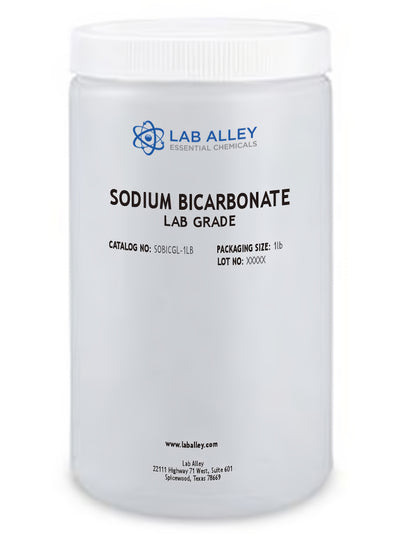
Business Support
Sodium Bicarbonate Reagent Grade
For questions regarding lead time, please contact a member of our Customer Care Team at customercare@laballey.com
Business Support
Description
About Sodium Bicarbonate Reagent Grade
Sodium Bicarbonate, also known as Sodium Hydrogen Carbonate, Carbonic Acid Monosodium Salt, Bicarbonate of Soda, and Baking Soda, has the chemical formula NaHCO3 or CHNaO3. It appears as colorless or white crystalline masses or crystalline powder having free solubility in Water and Methanol at ambient conditions. It is the monosodium salt of Carbonic Acid and has alkalinizing and electrolytic characteristics. When dissolved in Water, it dissociates into Sodium and Bicarbonate ions. In the human body, its presence can raise blood pH through buffering of excess hydrogen ions.
Reagent Grade chemicals have high purity and are best suited for analytical applications. They're important in research because of their reliable, dependable, and repeatable results. This Lab Alley product is highly recommended for research labs and commercial uses due to its high purity.
COMMON USES AND APPLICATIONS
- Reagent
- Chemical precursor
- Buffer solution
INDUSTRIES
- Fire extinguisher
- Fungicide
- Mild abrasive
- Gold and platinum plating
- Prevention of timber mold
PRODUCT INFORMATION
Customer Reviews and Q&A
Safety and Shipping
Moisture Sensitive
Please contact us to request a Safety Data Sheet (SDS) and Certificate of Analysis (COA) for Sodium Bicarbonate Reagent.
Business Support
Built for Business.
At Lab Alley, we simplify procurement with custom quotes, credit applications, tax exemptions, and fulfillment support, ensuring on-budget, on-time delivery - your success is our priority.
Apply for Credit
A Lab Alley credit account streamlines purchasing for your business. Our Customer Success Team is available to help you through every step of the process.
Request a Custom Quote
Get a fast, customized quote tailored to your specific needs. Our team ensures accurate pricing and availability to help streamline your purchasing process.

Additional Business Resources
Lab Alley provides access to essential certifications, documents, and other resources to support your business.
Certificates of Analysis

Create a Lab Alley Account

RECEIVE exclusive offers, promotions, and discounts on chemicals.

Always have the product you need, when you need it with our AUTOSHIP program.






